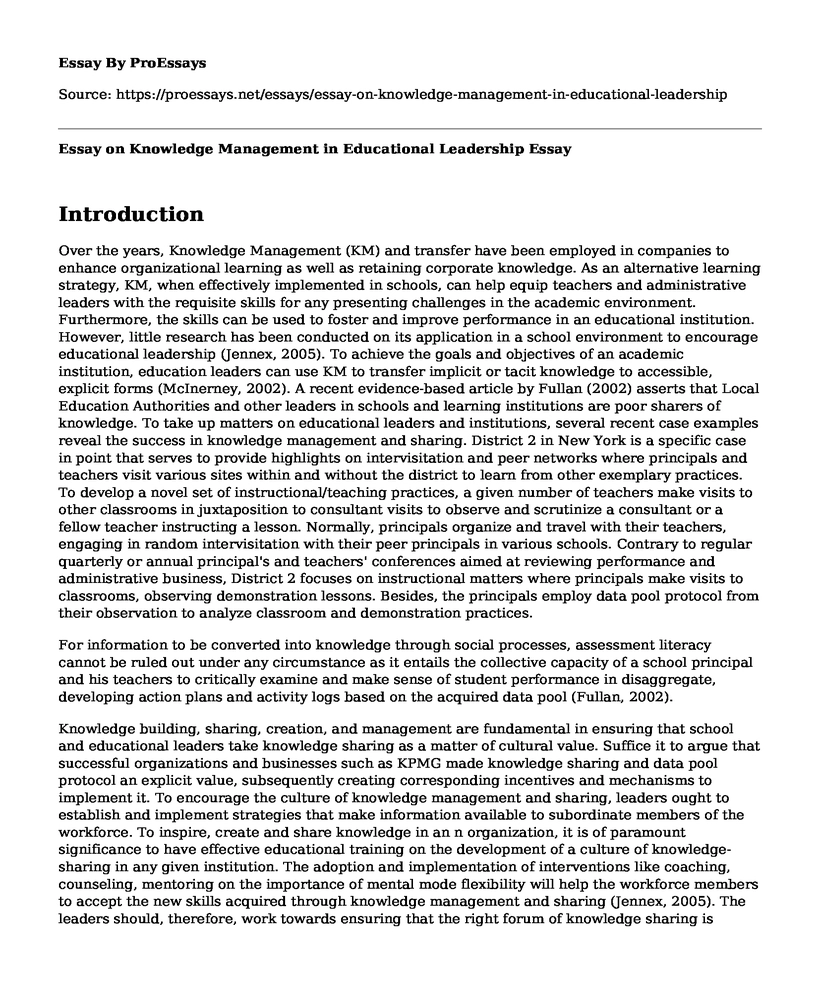Introduction
Over the years, Knowledge Management (KM) and transfer have been employed in companies to enhance organizational learning as well as retaining corporate knowledge. As an alternative learning strategy, KM, when effectively implemented in schools, can help equip teachers and administrative leaders with the requisite skills for any presenting challenges in the academic environment. Furthermore, the skills can be used to foster and improve performance in an educational institution. However, little research has been conducted on its application in a school environment to encourage educational leadership (Jennex, 2005). To achieve the goals and objectives of an academic institution, education leaders can use KM to transfer implicit or tacit knowledge to accessible, explicit forms (McInerney, 2002). A recent evidence-based article by Fullan (2002) asserts that Local Education Authorities and other leaders in schools and learning institutions are poor sharers of knowledge. To take up matters on educational leaders and institutions, several recent case examples reveal the success in knowledge management and sharing. District 2 in New York is a specific case in point that serves to provide highlights on intervisitation and peer networks where principals and teachers visit various sites within and without the district to learn from other exemplary practices. To develop a novel set of instructional/teaching practices, a given number of teachers make visits to other classrooms in juxtaposition to consultant visits to observe and scrutinize a consultant or a fellow teacher instructing a lesson. Normally, principals organize and travel with their teachers, engaging in random intervisitation with their peer principals in various schools. Contrary to regular quarterly or annual principal's and teachers' conferences aimed at reviewing performance and administrative business, District 2 focuses on instructional matters where principals make visits to classrooms, observing demonstration lessons. Besides, the principals employ data pool protocol from their observation to analyze classroom and demonstration practices.
For information to be converted into knowledge through social processes, assessment literacy cannot be ruled out under any circumstance as it entails the collective capacity of a school principal and his teachers to critically examine and make sense of student performance in disaggregate, developing action plans and activity logs based on the acquired data pool (Fullan, 2002).
Knowledge building, sharing, creation, and management are fundamental in ensuring that school and educational leaders take knowledge sharing as a matter of cultural value. Suffice it to argue that successful organizations and businesses such as KPMG made knowledge sharing and data pool protocol an explicit value, subsequently creating corresponding incentives and mechanisms to implement it. To encourage the culture of knowledge management and sharing, leaders ought to establish and implement strategies that make information available to subordinate members of the workforce. To inspire, create and share knowledge in an n organization, it is of paramount significance to have effective educational training on the development of a culture of knowledge-sharing in any given institution. The adoption and implementation of interventions like coaching, counseling, mentoring on the importance of mental mode flexibility will help the workforce members to accept the new skills acquired through knowledge management and sharing (Jennex, 2005). The leaders should, therefore, work towards ensuring that the right forum of knowledge sharing is created. This entails tacit knowledge, whose emphasis is specifically on informal communication and explicit knowledge that focus on several IT systems. In this regard, the management ought to create a strategy that promotes the design and creation of the relevant systems and processes, which provide administrative means and willingness for knowledge management and sharing to take place (McInerney, 2002). Henceforth, knowledge workers should be provided with timely and relevant data or information to encourage and enable sharing of knowledge.
References
Fullan, M. (2002). The role of leadership in the promotion of knowledge management in schools. Teachers and Teaching, 8(3), 409-419.
Jennex, M. E. (Ed.). (2005). Case studies in knowledge management. IGI Global.
McInerney, C. (2002). Knowledge management and the dynamic nature of knowledge. Journal of the American Society for Information Science and Technology, 53(12), 1009-1018.
Cite this page
Essay on Knowledge Management in Educational Leadership. (2022, Jun 30). Retrieved from https://proessays.net/essays/essay-on-knowledge-management-in-educational-leadership
If you are the original author of this essay and no longer wish to have it published on the ProEssays website, please click below to request its removal:
- Importance of Synergy in the Merger Between ArcelorMittal and Votorantim SA
- Corporate Social Responsibility (CSR) and Business Ethics Essay
- Managing Classroom Challenges Paper Example
- Operational Strategy: Case Study, Apple Inc.
- Essay on Privacy, Ethics, & Data Protection: Seeking & Sharing Sensitive Information
- Securing User Information with mHealth Technology: Data Encryption & More - Essay Sample
- Executive Nurse Leadership: A Path to Quality Improvement in Care - Essay Sample







